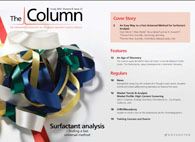Food focus
Waters (Milford, Massachusetts, USA) and the Food and Environment Research Agency (Fera) (York, UK) have announced that they will open a new laboratory-based training facility which will combine their respective regulatory, scientific and industry expertise to help solve the global food safety challenge.
Waters (Milford, Massachusetts, USA) and the Food and Environment Research Agency (Fera) (York, UK) have announced that they will open a new laboratory-based training facility which will combine their respective regulatory, scientific and industry expertise to help solve the global food safety challenge. This will be the UK’s first food safety training lab.
The Fera International Food Safety Training Laboratory (Fera IFSTL) will teach the best available techniques for testing for food contamination and educating on the different food safety regulatory standards around the world. This will assist testing organizations to detect contaminated food and increase compliance with food regulations. The training facility, based near York, will primarily train those concerned with exporting foods to Europe.
As part of the collaboration with Fera, Waters will help establish the laboratory’s construction, provide analytical systems and assist Fera in designing training programmes.
James N. Willis, PhD, senior director, global market development, Waters Corporation, stated, “Global food trade has more than tripled since 1990; exports now total nearly $1tn per year. This steep growth rate makes the task of assuring food safety increasingly difficult. Government inspections alone are not the answer. One solution (recognized by APEC, World Bank, FDA, etc.) is to improve food safety at the origin, which requires an understanding of standards and increased scientific training to know how to meet them.”
Mike Wray, operations director, FERA, commented, “The training lab will help promote a harmonization of practices that will strengthen the safety of the food supply before it reaches the table. Fera will be able to provide dedicated, bespoke training facilities. This would not be possible without private investment. Fera have provided training in the past, however to have an onsite facility with excellent equipment and designated space will enable Fera to build a reputation for excellent training to match its excellence in science.”
For more information please visit www.waters.comThis story originally appeared in The Column. Click here to view that issue.
Common Challenges in Nitrosamine Analysis: An LCGC International Peer Exchange
April 15th 2025A recent roundtable discussion featuring Aloka Srinivasan of Raaha, Mayank Bhanti of the United States Pharmacopeia (USP), and Amber Burch of Purisys discussed the challenges surrounding nitrosamine analysis in pharmaceuticals.
Extracting Estrogenic Hormones Using Rotating Disk and Modified Clays
April 14th 2025University of Caldas and University of Chile researchers extracted estrogenic hormones from wastewater samples using rotating disk sorption extraction. After extraction, the concentrated analytes were measured using liquid chromatography coupled with photodiode array detection (HPLC-PDA).










